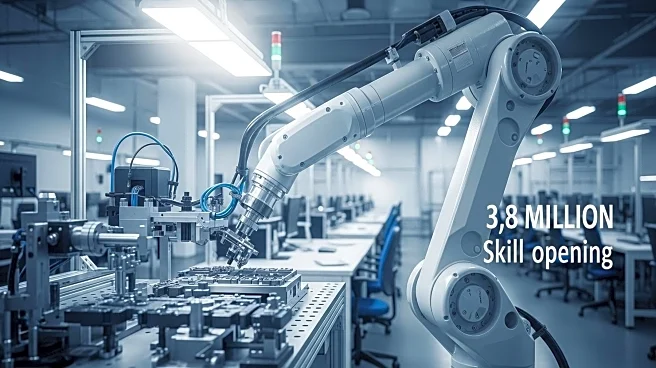What is the story about?
What's Happening?
The U.S. manufacturing industry is projected to face up to 3.8 million job openings over the next decade, according to a study by The Manufacturing Institute and Deloitte. The sector has rebounded strongly from the global pandemic and is positioned for further growth, which will increase demand for skilled workers. Key roles needed include statisticians, data scientists, logisticians, engineers, computer and information systems managers, software developers, and industrial maintenance technicians. The report highlights that if workforce challenges are not addressed, more than 1.9 million of these roles could go unfilled. Manufacturers are increasingly forming partnerships to strengthen recruitment and retention efforts, with nearly two-thirds citing talent attraction and retention as their primary business challenge.
Why It's Important?
The potential shortage of skilled workers in the manufacturing sector could have significant implications for the U.S. economy. As manufacturing is a critical component of economic growth, the inability to fill these positions may hinder expansion and innovation within the industry. This could lead to slower economic recovery and growth post-pandemic. Companies that fail to address these workforce challenges may struggle to compete globally, impacting their profitability and market share. The emphasis on digital skills and flexible work arrangements reflects broader trends in the labor market, where adaptability and technological proficiency are increasingly valued.
What's Next?
To address the skills gap, The Manufacturing Institute is implementing several initiatives, including a high school internship toolkit and the FAME USA apprenticeship program. These efforts aim to create early-stage recruiting pipelines and train globally competitive, multi-skilled maintenance technicians. The focus on apprenticeships and flexible work arrangements suggests a shift towards more dynamic and inclusive workforce strategies. As these initiatives roll out, manufacturers will need to evaluate their effectiveness in attracting and retaining talent, potentially adjusting their strategies based on outcomes and feedback.
Beyond the Headlines
The study highlights the ethical and cultural dimensions of workforce development in manufacturing. As the industry evolves, there is a growing need to ensure equitable access to training and career opportunities, particularly for underrepresented groups. The emphasis on partnerships and community engagement reflects a broader societal shift towards collaborative approaches in addressing economic challenges. Long-term, these efforts could lead to a more diverse and resilient manufacturing workforce, capable of driving innovation and sustaining growth.















